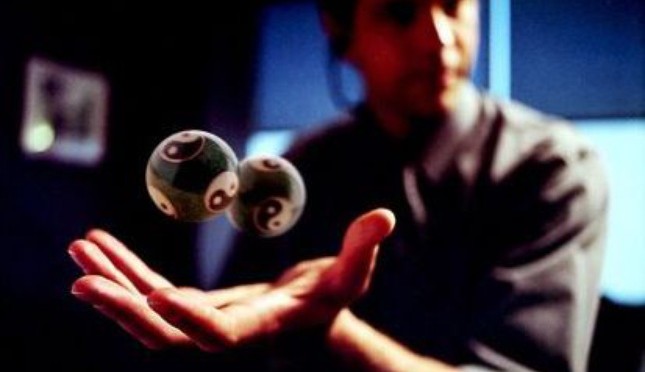We’ve written about Wolfgang Pauli before, but we’re taking a closer look now at some of the strange stories about his apparent psychokinetic powers as we begin research for a book on psychokinesis—sometimes referred to as mind over matter.
+ + +
There are some people who enter a room and stuff happens. Appliances go berserk, computers crash, cell phones act up. Theoretical physicist and Nobel laureate Wolfgang Pauli, one of the early supporters of Jung’s theory on synchronicity, was one such person.
From early on in his career, colleagues noticed that whenever he entered a lab, equipment broke down spontaneously. It happened so frequently when Pauli was around, his coworkers called it “the Pauli effect.” Over time, most of the scientists with whom Pauli worked knew about it. Physicists at the university in Hamburg where he worked were convinced that Pauli’s presence anywhere near a lab led to a breakdown in equipment. Otto Stern, a fellow physicist, eventually forbade Pauli to enter the lab.
Imagine what a dilemma the Pauli effect must have been for fellow scientists, particularly for Stern, a Nobel laureate in physics. Psychokinesis, which hasn’t been proven—not to the satisfaction of mainstream science—happened often when Pauli walked into a lab.
“The Pauli effect, as it became known, was obviously impossible; it had to be just a matter of coincidence,” wrote Arthur I Miller in Deciphering the Cosmic Number. “But nevertheless, it happened again and again.”
Miller’s statement is an oxymoron. If something “impossible” occurs repeatedly, then it isn’t impossible. And apparently the Pauli effect could happen even when Pauli wasn’t present.
In Miller’s book, he discusses an incident that happened in the 1920s. One afternoon at the University of Gottingen in Germany, a complicated apparatus for the study of atoms collapsed, without apparent cause. Pauli was in Switzerland at the time. “At last, said his colleagues, relieved, here was clear proof it couldn’t be the Pauli effect.”
The professor in charge of the laboratory wrote Pauli, telling him about the event. After a protracted delay, he received a letter from Pauli saying that he had been on his way to Copenhagen, but at the moment the equipment broke down, his train had stopped for a few minutes at the Gottingen station.
Miller also relates another story that happened in 1955. In celebration of the 50th anniversary of the discovery of Einstein’s special theory of relativity, Pauli was to lecture at the Zurich Physical Society. Three of his friends and colleagues had dinner with him beforehand, then they all set out for the lecture. One Swiss physicist was on his scooter, saw he was low on gas, and stopped at a gas station. His scooter caught fire, was totaled, and he had to walk. A second Swiss physicist discovered that his bike had two flat tires, so he had to walk, too. The third man took the tram, which he did frequently, but forgot to get off at the right stop.
They all made it to the lecture, but one of the men involved noted that with the Pauli effect, Pauli himself never experienced any harm.
As one of Pauli’s close friends said, “It is quite legitimate to understand the ‘Pauli effect’ as a synchronistic phenomenon as conceived by Jung.”









This should be an interesting book.
You would love this book, Adele.
Fascinating! Thanks for posting.